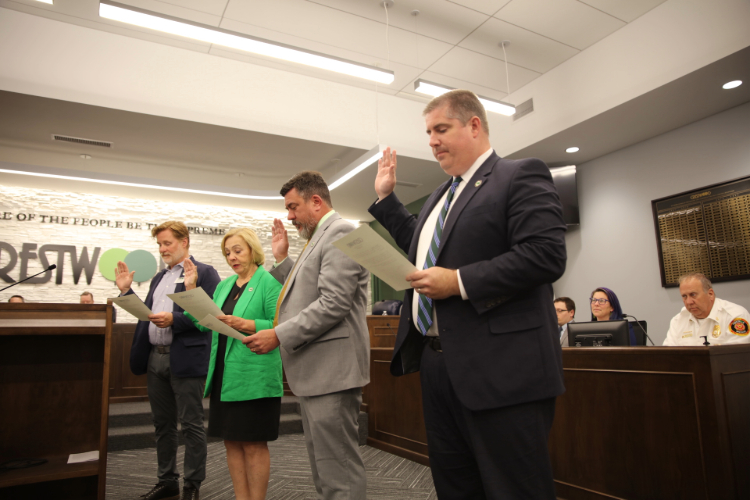Rep. Walt Bivins, R-Oakville, believes that if Missouri firefighters want a say in their pension plan, they first must do what taxpayers have already done — pay for it.
Bivins planned Monday to introduce an amendment to a Senate bill that originally proposed the implementation of a new, separate board of trustees to administer fire districts’ retirement plans.
As proposed in Senate bills 22, 406 and 492, pension boards for each fire district would be comprised of the district’s three-member board of directors and two salaried firefighters chosen by the board of directors from a pool of three nominations elected by plan members.
But Bivins’ proposal would allow the addition of two firefighters on a new pension board only if employees for that fire district accept a contributory pension plan.
Simply put, if firefighters contribute part of their pay to their retirement plans in-stead of solely relying on taxpayer funding for that pension, then Bivins believes they should have a voice on the pension board.
“Frankly, I wasn’t aware that an amendment had been made to the Senate bill that was going to change the way it was,” Bivins said Monday. “And when I found that out, after discussing it with a number of folks, I felt like this was the best solution to where taxpayers would be protected for a non-contributory plan. And the firefighters, where it was a contributory plan, would have some input.”
Bivins’ proposal comes less than a week after Mehlville Fire Protection District Board of Directors Chairman Aaron Hilmer, Treasurer Bonnie Stegman and former Lemay Fire Protection District Board of Directors Chairman Jim Stonebraker testified in opposition to the originally proposed Senate bill in the Missouri House.
Hilmer and Stegman have tried to administer a contributory retirement plan for Mehlville fire district employees, but are prevented by a preliminary injunction from making any changes to the district’s pension plan. The Mehlville fire board’s decision to provide a defined-contribution retirement plan to employees was challenged in a lawsuit filed last year by Local 1889 of the International Association of Fire Fighters.
In an effort to prevent Senate Bill 22 from revising Missouri Revised Statutes Section 321.800, Hilmer testified April 17 in the Missouri House that the proposals would “usurp” each fire-district board’s elected authority.
In his written testimony before a House panel, Hilmer said, “If passed in its current state (Section) 321.800 will benefit not one person whom you are elected to represent or anybody else in the state of Missouri, unless you happen to be an employee of a fire protection district.
“Laws should be passed to protect and preserve the rights of the people, not to give them away to special interest groups. (Section) 321.800 will do just that. It will usurp the will of the voters by handing over decisions about tax dollars to public employees who are unelected and accountable to no one except themselves.
“We were successful and have since pointed out how employees were retiring with pension checks in excess of $750,000. District employees contributed nothing while the public contributed everything. Employees were placed on disability, whereas they would receive a monthly check for the rest of their lives.
“We have recently uncovered how one employee has thus far received $430,000 from the taxpayers while gainfully em-ployed at another ambulance district. He has also continued to accrue full retirement benefits even though he hasn’t worked for us in 13 years. It is clear that the purse strings need be tightened not loosened as 321.800 is attempting to do.
“321.100 would require only one director to agree with the employees in order to give away more pension benefits and tax dollars. It in effect says that residents would have to elect all three board positions in order to make pension changes. To put that in perspective, how absurd would it be to think that a party would have to control all 163 state representative seats before being able to pass a vote? That example shows the absurdity of 321.100 in its current form.
“I would ask that the word advisory be put into this bill in order to give the employees a voice, but most importantly leave the final decisions over the resident’s money where it belongs, in the pockets of the voters,” Hilmer stated in his testimony.
Stegman also testified that she believes the proposal would “undermine” the board of directors and, in her written testimony, said Senate Bill 22 “gives employees that do not contribute to the plan power to direct taxpayer funds. It circumvents the electoral process in which the taxpayers have the ability to have their interests be the guiding factor in decisions that involve tax dollars by voting for board members.
“(It) creates a conflict of interest by granting non-contributory participants the power to set the amount and type of pension fund. I suggest that this section be stricken from the bill or a change in language resulting in the creation of an advisory board with final decisions by the Board of Directors be instituted.”
Stonebraker also testified that Senate Bill 22 would create a conflict of interest by allowing public employees to set their pension benefits without the will of voters.
In his written testimony, Stonebraker said the bill “creates a pension board that destroys an elected majority (two members of a three-member board or three members of a five-member board) and allows an unelected majority (one director and two employees or two directors and two employees) to decide all pension issues.”
He also wrote that the proposal “potentially allows employees and a minority of directors to place pension initiatives on the ballot without a majority vote of elected officials.”
In response to these concerns, Bivins said his proposal still would allow firefighters the right to set their pension plan, but only if they accept a compensatory plan.
“It’s going to keep the non-contributory plan administered by the board of directors,” Bivins said. “However, where it’s a contributory plan where the firemen are actually contributing their salary to their own retirement, then the board that administers would expand. The directors would still make the majority of the board. But there would be two firemen representatives on the board. So there would be a five-man board then.
“That way, they would have some input as to how their retirement funds are invested. But this way, where there is a non-contributory plan, the taxpayers’ elected representatives would be administering that plan.”





















